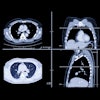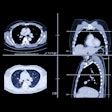
Researchers from Florida have developed an artificial intelligence (AI) algorithm capable of detecting even tiny lung tumors on CT scans with approximately 95% accuracy.
The group, led by Ulas Bagci, PhD, from the University of Central Florida, designed a 3D convolutional neural network to spot lung nodules of all expected sizes automatically, without the need for a user to guide the detection process. Called S4ND, the algorithm can find small nodules on CT scans, which radiologists often have a difficult time identifying, the authors noted.
S4ND is designed to detect nodules in one step using a single-scale network, an approach the authors believe is novel. The algorithm uses "convolution blocks with dense connections," which make one-step nodule detection feasible from a computational approach, they wrote.
They tested S4ND on nearly 1,000 chest CT scans from the Lung Nodule Analysis 2016 (LUNA16) dataset and found that it outperformed current detection methods. S4ND achieved an average score of 0.897 on a competition performance metric of accuracy and 95.2% sensitivity.
Bagci and colleagues will present their work at the upcoming International Conference on Medical Image Computing and Computer Assisted Intervention (MICCAI) in Granada, Spain.




















